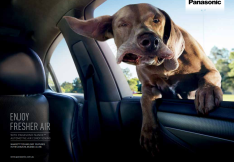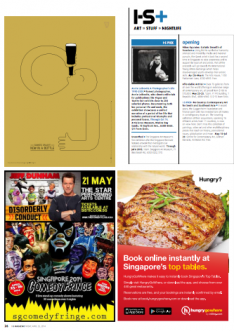AWARD chairman denies scam is ‘widespread’ in Australia and defends role of creative awards

Chairman of the AWARD Awards Mark Harricks has said he does not believe the issue of scam ads created solely to win awards is “widespread” in Australia.
Harricks, who is creative partner at The Works, told Mumbrella that scam work “undermines the integrity of awards”, but insisted the AWARD Awards have a “number of checks and balances in place” to ensure the entry requirements are met. “We’ve also found that our judges are especially sensitive to scam work, it’s their integrity on the line as well,” he added.
He also stressed “the role of creative awards is to recognise great ideas, craft and innovation in order to inspire and raise the bar”.
His comments come after ads entered by Australian agencies in this year’s Press category Cannes Lions competition came under scrutiny, including Saatchi & Saatchi’s Silver Lion winning work for Panasonic (right) and DDB’s Bronze winning McDonald’s executions, with those agencies and clients refusing to reveal where the work had run.

One of Saatchi & Saatchi’s award winning Panasonic executions
A subsequent investigation by Mumbrella discovered the DDB McDonald’s work ran in News Corp title The Rouse Hill Times, although searches by two media monitoring companies have not uncovered where the Saatchi & Saatchi Panasonic ads ran.
According to the AWARD website, they attract around 2,000 entries across a number of categories including film and video, craft in film, print, integrated campaign, posters and outdoor, PR, print craft, radio, direct marketing, design, digital, promotion & experiential, new product development and media and creative innovation.
Harricks added: “Having judged many awards, I truly believe work that hasn’t run, wasn’t approved or wasn’t for a real client is not widespread in awards. There are so many checks in place with award shows, and the judges themselves are ultra sensitive.
“In this day and age, in an industry as small as ours, there is a very high chance of scam work being exposed. Reputation is highly valued in our industry, and consequently creatives and agencies wouldn’t want to risk it by crossing that line.
“The best place to stamp out non-compliant work is before it is judged, “he added.
“AWARD’s position is very clear on the type of work we accept. All entries are required to have a signed letter from the client endorsing the entry and confirming that it has run. The judges also have an opportunity to review and discuss the validity of work in the judging process. As I said before they are acutely aware it is their reputation at stake as well.
“Scam work in an AWARD context, creates an uneven playing field. Winning an award is hard enough without competing against work that has not run, not been approved or isn’t for a real product/service. Scam work undermines the integrity of the peer recognition that creative awards provide.”
The issue of scam is a growing one for the advertising industry, with claims that some work is created to win awards, rather than solve a clients’ marketing problems. A hallmark of scam advertising is when work for a major brand appears only once, in a low cost publication, close to an entry deadline.
His advice to agencies entering awards was simple – follow the rules and be as transparent as possible.
“Entry requirements are very clear and agencies must abide by them. If there’s speculation around this, it helps to be as transparent as possible. This can be difficult if there are restrictions around the sort of information you are able to share. It’s a situation the client and agency must consider together.
“I think, as part of this discussion, it is important to reiterate, the role of creative awards is to recognise great ideas, craft and innovation in order to inspire and raise the bar,” Harricks added.
His comments come after the global boss of BBDO told Mumbrella’s sister title Mumbrella Asia that he trusts his staff “to do the right thing” when it comes to entering work for awards shows.
Andrew Robertson, who last month celebrated his tenth anniversary as the president and CEO of BBDO Worldwide, told Mumbrella Asia that creative agencies “should be winning awards for real work for real clients – not local bike shops or dry cleaners.”

Guinness ad as it appeared in I-S Magazine
His comments were in response to questions from Mumbrella Asia for his views on advertising scam – work created purely to win awards – after a campaign for Guinness by BBDO’s Singapore office, which ran just once in a free listing magazine went on to win three Silver Lions in the Press category at Cannes.
Robertson said he was not familiar with the details of the ‘Pint in a glass’ campaign, which also won a gold and silver in the Outdoor Lions this year, but had been “assured it qualified”.
He said: “I am frankly not familiar with the details of the Guinness campaign you refer to, but have been assured it qualified. Nor do I attempt to control what work our agencies around the world enter. There is too much of it, and, more importantly, I trust our people to do the right thing.
“Our position is that we should be winning awards for real work for real clients – not local bike shops or dry cleaners – and, obviously, it has to comply with the rules of the competition in question,” he said.
Earlier this year, BBDO was named top of The Gunn Report, a global ranking of the most awarded agencies, for the eighth year in a row, and for the eleventh time in the report’s history.
Links to Mumbrella’s complete coverage of the issue can be found here.
Miranda Ward

